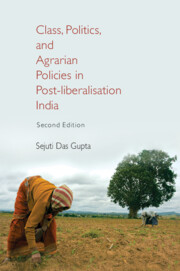Book contents
- Frontmatter
- Dedication
- Contents
- List of Tables and Figures
- List of Abbreviations
- Acknowledgements
- Maps
- 1 Introduction
- 2 Policy-making, Class Factor, and Political Settlement: Setting the Theoretical Framework
- 3 Privatising the Inputs of Production: A Case of Careful Choice of Beneficiaries and Losers
- 4 Chhattisgarh: New State, New Opportunities for Old Class Domination
- 5 Gujarat: Strong State-directed Capitalism across Sectors
- 6 Karnataka: State Patronage, Market Opportunism, and Urban–Rural Closing Gap
- 7 State in Action, Political Settlement, and the Agrarian Flux
- Bibliography
- Index
1 - Introduction
Published online by Cambridge University Press: 30 April 2024
- Frontmatter
- Dedication
- Contents
- List of Tables and Figures
- List of Abbreviations
- Acknowledgements
- Maps
- 1 Introduction
- 2 Policy-making, Class Factor, and Political Settlement: Setting the Theoretical Framework
- 3 Privatising the Inputs of Production: A Case of Careful Choice of Beneficiaries and Losers
- 4 Chhattisgarh: New State, New Opportunities for Old Class Domination
- 5 Gujarat: Strong State-directed Capitalism across Sectors
- 6 Karnataka: State Patronage, Market Opportunism, and Urban–Rural Closing Gap
- 7 State in Action, Political Settlement, and the Agrarian Flux
- Bibliography
- Index
Summary
India has been rapidly changing since globalisation, albeit not uniformly. In 2022, India has been found to be the most unequal country in the world (Chancel et al., 2022). This makes it critical to understand where the inequality came from: is it new or structural or something else? Several characterisations have been attributed to India's transformation since globalisation; some talk about rapid urbanization, fast growth with incoming global investments, the IT boom, and an expanding middle class, while another set of scholars highlight aspects such as the agrarian crises, farmers’ suicides, food insecurity, and corruption. The point, however, is to comprehend how each version of this story has a saga of unequal distribution within it, whether in cities or villages. India being the most unequal country in a Marxian term means certain classes are accumulating and others are not even able to reproduce themselves. This makes it even more crucial to look at ‘capital’, and how it is accumulating, which spreads across the urban and rural. This book offers an in-depth analysis of diversification and various sources of accumulation accessed by the agrarian proprietary class, and a discussion on the other two proprietary classes, the petty bourgeoisie and the capitalist. By disaggregating the sources along fractions of the agrarian proprietary class, it shows how the class adopted new means within agriculture and outside agriculture, to further accumulation during the 2004–2014 policy regime. The policies under scrutiny are agricultural and those related to rural population in general, such as Panchayati Raj institutions (PRIs), land acquisition and affirmative action in employment. The latter may serve caste groups but in addition contribute to consolidating class structure. What these policies demonstrate is the key role played by the state in the globalisation era, thereby maintaining a stable political settlement with the three proprietary classes. The state and the nature of the state are important questions raised in this book, thus ‘bringing the state back in’, as Skocpol (2010) once argued. This book's third contribution is that it brings an understanding of classes that does not begin from being informed by abstract categories but rather begins with the empirical observations that guide the formulation of the conceptual classes and fractions. Skocpol finds neo-Marxism's conceptualisation of state very abstract, therefore hard to be applied, and hence starting from the empirical to the abstract following a methodology of ‘thick description’ (Geertz 1973) is an attempt to address that limitation.
- Type
- Chapter
- Information
- Publisher: Cambridge University PressPrint publication year: 2024

